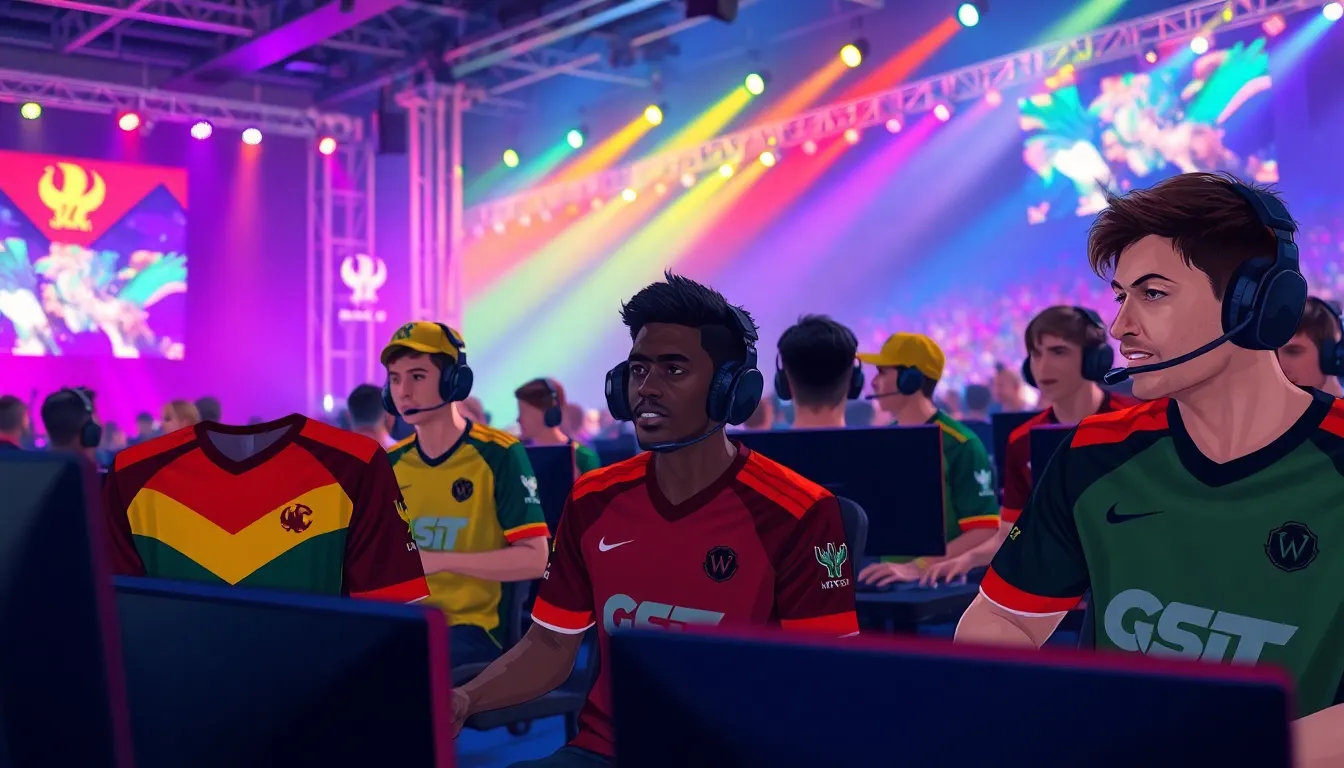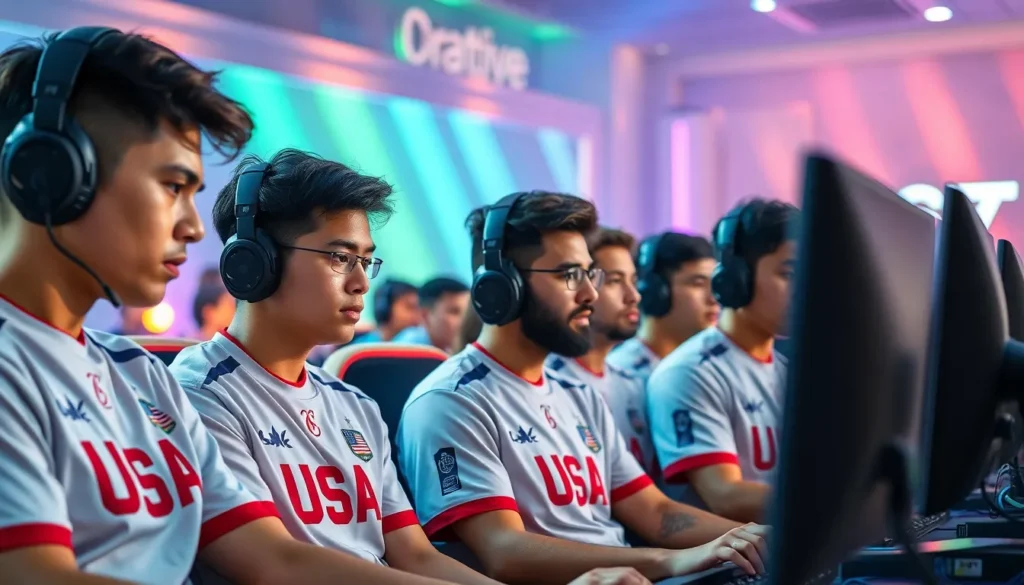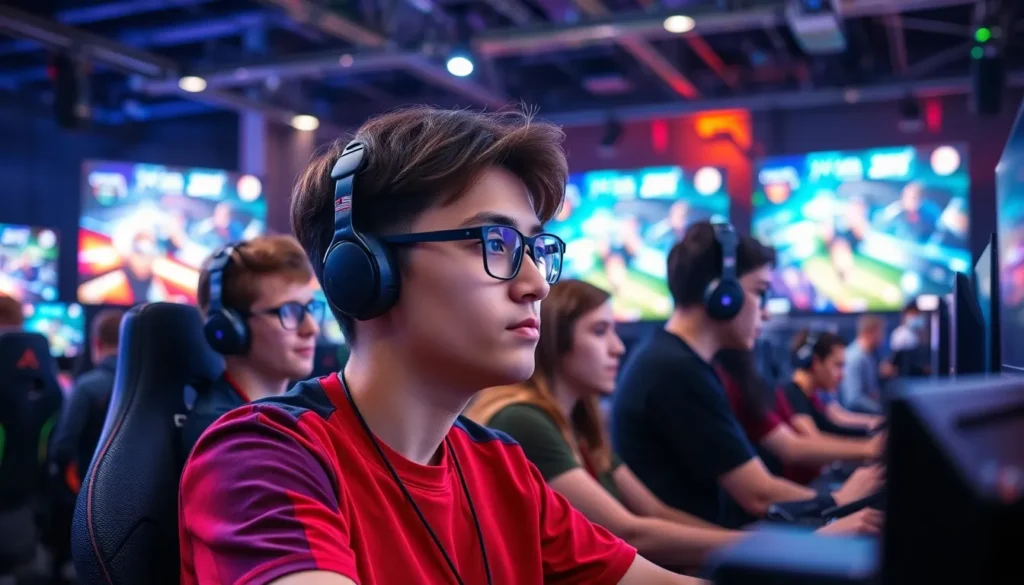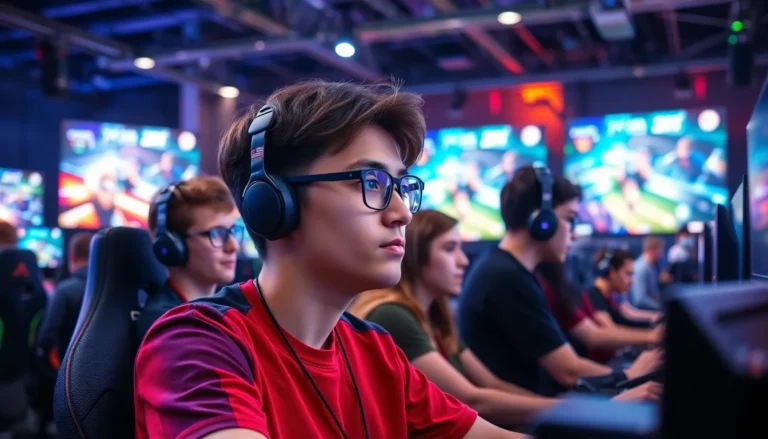Table of Contents
ToggleEsports sponsorships are shaking up the marketing world faster than a speedrun through a retro game. As millions tune in to watch their favorite gamers battle it out, brands are realizing that this digital arena is the new frontier for reaching engaged audiences. It’s not just about logos on jerseys anymore; it’s about creating authentic connections with fans who live and breathe gaming.
Understanding Esports Sponsorships
Esports sponsorships represent a growing trend where brands collaborate with gaming entities to engage audiences. These partnerships extend past traditional marketing, creating unique opportunities to connect with dedicated fans.
Definition of Esports Sponsorships
Esports sponsorships involve financial or resource support from a brand to esports teams, events, or individual players. This type of partnership often includes branding on team jerseys, promotional content, or event advertising. Companies invest capital or products to gain visibility and foster community ties. Sponsorships can also encompass collaborations on content creation or gameplay that enhances brand recognition.
Importance in the Gaming Industry
Esports sponsorships play a significant role in the gaming industry‘s expansion. They provide essential revenue streams for teams and organizations, allowing for enhanced player support and development. Engaging esports fans cultivates brand loyalty and increases customer engagement. Statistics show brands seeing substantial ROI through these partnerships, emphasizing the effectiveness of integrating into the gaming culture. In turn, successful collaborations create a win-win scenario for both sponsors and the esports community.
Types of Esports Sponsorships

Esports sponsorships come in various forms, allowing brands to connect uniquely with gaming audiences. Understanding these types helps companies decide where to invest.
Team Sponsorships
Team sponsorships provide brands with visibility through logo placement on team jerseys, promotional materials, and merchandise. Companies often sponsor entire teams, enabling them to reach dedicated fan bases. Financial support usually helps cover player salaries and training facilities, fostering talented rosters. These partnerships increase brand recognition while demonstrating commitment to esports growth. Successful examples include Red Bull and Team SoloMid, showcasing how mutual benefits enhance community engagement.
Event Sponsorships
Event sponsorships involve brands supporting esports tournaments or leagues, creating unforgettable experiences for fans and players alike. Through these sponsorships, companies gain exposure via event branding, promotional content, and official merchandise. The accessibility of live streams offers advertisers an opportunity to reach a global audience in real-time. Notable sponsors like Intel and Coca-Cola prominently feature at major events, reinforcing their association with innovation and entertainment. Engaging with fans during events helps build lasting relationships between brands and the gaming community.
Streamer Sponsorships
Streamer sponsorships focus on individual content creators who engage large online audiences through platforms like Twitch and YouTube. Companies collaborate with popular streamers to showcase products while they play, allowing for authentic endorsements. This model thrives on relatability, as audiences often view streamers as peers. Sponsoring streamers provides brands with direct access to niche communities tailored to specific genres. Brands like Logitech and Razer frequently partner with influencers, reinforcing their image in the gaming world. These collaborations foster genuine connections and enhance brand loyalty among fans.
Major Brands Involved in Esports Sponsorships
Esports sponsorships attract a diverse array of brands. These partnerships highlight the significant investment traditional and gaming companies make in the esports landscape.
Traditional Companies
Many traditional companies have recognized the potential of esports sponsorships to reach engaged audiences. Fast-food chains like McDonald’s partner with esports events, using sponsorship opportunities to enhance their brand visibility. Established tech firms such as Intel invest in gaming tournaments, showcasing their processors in competitive settings. Coca-Cola has also joined the scene, utilizing its sponsorships to connect with younger demographics. Retailers such as Walmart support esports teams and events, integrating their brands into gaming culture. Each of these companies leverages unique promotional strategies to enhance brand loyalty and foster community engagement.
Gaming Developers
Gaming developers play a crucial role in shaping the esports sponsorship landscape. Major players like Riot Games lead the charge in sponsoring their own leagues, such as the League of Legends Championship Series. These developers often collaborate with various brands to create immersive experiences for fans. Activision Blizzard utilizes sponsorships in the Overwatch League, integrating commercial partners into the competitive gaming framework. Electronic Arts sponsors esports events for their franchises, improving player engagement and visibility. These partnerships not only generate revenue but also enhance the connection between developers and their gaming communities.
Impact of Esports Sponsorships
Esports sponsorships significantly shape the gaming industry by fostering financial growth and enhancing audience engagement.
Financial Growth for Teams
Sponsorships offer essential funding that supports esports teams’ operational expenses. Brands like Red Bull provide financial backing for team salaries and training facilities, enabling players to enhance their skills without financial strain. Teams can afford to invest in talent development and infrastructure, thus boosting competitive performance. Financial stability from sponsorships often leads to longer team lifespans in the industry. Revenue generated through partnerships also allows teams to explore innovative marketing strategies to further expand their presence.
Audience Engagement and Reach
Sponsorships create unique opportunities for brands to interact with engaged gaming audiences. Event sponsorships enable companies like Intel to gain exposure through live streams and event branding, directly reaching millions of viewers. Streamer sponsorships connect brands with niche audiences seeking authenticity, as seen with Logitech and Razer promoting their products through popular content creators. By embedding themselves within the gaming culture, brands enhance recognition and loyalty among players. These strategies help cultivate a loyal fanbase, resulting in increased customer engagement and sales.
Challenges in Esports Sponsorships
Esports sponsorships face distinct challenges that can hinder success. Key issues include market saturation and brand safety concerns.
Market Saturation
Market saturation presents a significant hurdle for brands entering the esports space. As more companies recognize the potential, competition for visibility intensifies. Numerous brands now vie for attention within tournaments and teams, making it harder for individual sponsors to stand out. For instance, hundreds of companies may sponsor a single major tournament, diluting brand impact. Standing out requires innovative strategies and unique activations. Brands must carefully select partnerships that align with their messaging and audience to ensure effective engagement. Effective market research identifies gaps and opportunities, allowing sponsors to tailor their approaches to benefit from less competition.
Brand Safety Concerns
Brand safety concerns create obstacles in the esports sponsorship landscape. Brands seek to affiliate with content that aligns with their values and engages audiences positively. However, issues like toxic behavior within gaming communities can lead to adverse publicity. Companies face risks whether they sponsor teams or events linked to controversies. Ensuring positive representation and maintaining brand image becomes crucial. Partnering with organizations emphasizing responsible behavior mitigates risks. Clear guidelines and best practices help shape partnerships that align with brand safety priorities. Continuous monitoring of community interactions can maintain brand integrity throughout sponsorship engagements.
Esports sponsorships are transforming the way brands engage with audiences in the gaming community. By investing in team, event, and streamer partnerships, companies can tap into a dedicated fanbase eager for authentic connections. These collaborations not only drive financial growth for esports organizations but also enhance brand loyalty and customer engagement.
As the esports landscape continues to evolve, brands must navigate challenges like market saturation and brand safety. By carefully selecting partnerships and focusing on genuine relationships within the gaming culture, companies can maximize their return on investment. The future of esports sponsorships promises exciting opportunities for both brands and the gaming industry as a whole.







